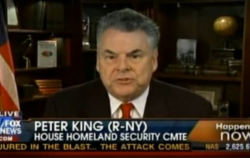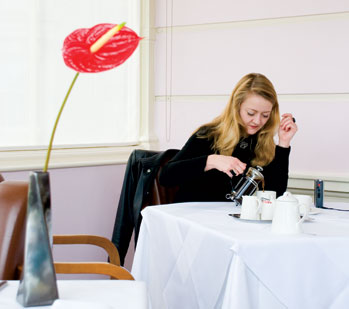Here is a recent interview I did for the Real News Network about the global and European fall-out from the Edward Snowden disclosures:
And here’s a version with the text.
Tag Archives: whistleblowing
Interview, Czech National Radio
Here is a link to an in-depth interview I did recently at the Czech national radio station in Prague.
As a Director of Law Enforcement Against Prohibition (LEAP), I was invited to Prague by the progressive Czech National Drug Co-ordinator, Jindrich Voboril, to speak at a drugs conference in the Czech Parliament.
The Lindmo Show, Norway
Following on from my talk at the Norwegian SKUP investigative journalism conference in March, I was invited onto the Anne Lindmo Show in Norway on 4 May.
Anne is one of the most famous and respected journalists in Norway, and her chat show is extremely popular on prime time NRK TV on Friday nights. We had a lively session discussing the world of spying, what it was like to blow the whistle and go on the run, and the personal price that has to be paid.
Here’s the link to the whole show, and here’s my segment:
Lindmo interview on Norwegian TV from Annie Machon on Vimeo.
Talks in Sweden and Norway
Off on my travels again at the end of the week, with two keynotes at Scandinavian journalism conferences.
 I shall first be speaking at the Grav conference in Sweden on Friday 23 March.
I shall first be speaking at the Grav conference in Sweden on Friday 23 March.
 Topics under discussion will include everything from security and intelligence to the war on terror, civil liberties to ethics and media freedoms, government accountability to whistleblowing and Wikileaks.
Topics under discussion will include everything from security and intelligence to the war on terror, civil liberties to ethics and media freedoms, government accountability to whistleblowing and Wikileaks.
On Saturday I travel on to Norway to speak at the SKUP conference to give a talk and also on Sunday morning to participate in a panel discussion about all things whistleblowing and Wikileaks. I gather that such discussions can get quite, um, lively.
I’m looking forward to an interesting and stimulating weekend.
Mediafabric talk, Prague, October 2011
Last October I had the pleasure of speaking at the excellent Mediafabric conference in Prague. The focus of my talk was the future of intelligence, whistleblowing and journalism.
The event was organised by Sourcefabric, an international organisation that provides open source tools and solutions for journalists, so it was an eclectic and stimulating crowd of journalists, geeks, hacktavists and designers. So well done and thank you to the organisers.
Here’s the video:
Durham Union Society Talk, 16 February 2011
 It’s a busy couple of months for talks, and I have the pleasure of speaking at the Durham Union Society tomorrow night (16th February).
It’s a busy couple of months for talks, and I have the pleasure of speaking at the Durham Union Society tomorrow night (16th February).
My talk will be focusing on the modern role of intelligence agencies, the war on terror, what it’s like to be recruited to work as a spook, whistleblowing, Wikileaks, police states and civil liberties. An eclectic mix.
The talk is open to all students, not just members of the Union, so if you’re in the area and have the time, do come along!
The murder of Pat Finucane
Moving swiftly past the prurient, thigh-rubbing glee that most of the old media seems to be exhibiting over the alleged details of Julian Assange’s love life, let’s re-focus on the heart of the Wikileaks disclosures, and most importantly the aims underpinning them: transparency, justice, and an informed citizenry living within fully-functioning democracies. Such quaint notions.
In the media maelstrom of the Cablegate disclosures, and the resulting infantile and thuggish threats of the American political class, is easy to lose sight of the fact that many of the leaked documents refer to scandals, corruption and cover-ups in a range of countries, not just the good old US of A.
 One document that recently caught my attention related to the notorious murder twenty-one years ago of civil rights activist, Pat Finucane, in Northern Ireland. Finucane was a well-known lawyer who was shot and killed in front of his wife and three small children. There has long been speculation that he was targeted by Protestant terrorist groups, in collusion with the NI secret police, the army’s notorious and now-disbanded Forces Research Unit (FRU), and/or MI5.
One document that recently caught my attention related to the notorious murder twenty-one years ago of civil rights activist, Pat Finucane, in Northern Ireland. Finucane was a well-known lawyer who was shot and killed in front of his wife and three small children. There has long been speculation that he was targeted by Protestant terrorist groups, in collusion with the NI secret police, the army’s notorious and now-disbanded Forces Research Unit (FRU), and/or MI5.
Well, over a decade ago former top plod, Lord (John) Stevens, began an inquiry that did indeed establish such state collusion, despite having his inquiry offices burnt out in the process by person/s allegedly unknown half-way through the investigation. Stevens fought on, producing a damning report in 2003 confirming the notion of state collusion with Irish Loyalist terrorist activities, but never did clarify exactly what had happened to poor Pat Finucane.
However, Finucane’s traumatised family has never stopped demanding justice. The recent disclosure shines a light on some of the back-room deals around this scandal, and for that I’m sure many people thank Wikileaks.
The “Troubles” in Northern Ireland — such a quintessentially British understatement, in any other country it would have been called a civil war — were deceptive, murky and vicious on both sides. “Collusion” is an elastic word that stretches beyond the strict notion of the state. It is well-known that the US organistion, NORAID, supported by many Americans claiming Irish ancestry, was a major fundraising channel for, um, Sinn Féin, the political wing of the Provisional IRA, from the 1970s onwards.
 Such networks provided even more support than Colonel Gaddafi of Libya with his arms shipments, and the cash well only dried up post‑9/11. As you can see in this recent article in the The Telegraph, even the incoming Chairman of the House Homeland Security Committee, New York Congressman Peter King (who ironically called for the designation of Wkileaks as a “foreign terrorist organisation”) appears to have been a life long supporter of Sinn Féin.
Such networks provided even more support than Colonel Gaddafi of Libya with his arms shipments, and the cash well only dried up post‑9/11. As you can see in this recent article in the The Telegraph, even the incoming Chairman of the House Homeland Security Committee, New York Congressman Peter King (who ironically called for the designation of Wkileaks as a “foreign terrorist organisation”) appears to have been a life long supporter of Sinn Féin.
With this in the back of our minds, it appears that Dublin and Washington kept pushing for a full inquiry into Finucane’s murder — and in 2005 it looked like MI5 would finally co-operate.
However, the devil was in the detail. Coincidentally, 2005 was the year that the UK government rushed through a new law, the Inquiries Act, which scandalously allowed any department under investigation (in this case MI5) to dictate the terms and scope of the inquiry.
Collusion by any state in the unlawful arrest, torture, and extrajudicial murder of people — whether its own citizens or others — is state terrorism. Let’s not mince our words here. Amnesty International provides a clear definition of this concept.
As the The Guardian article about Finucane so succintly puts it:
“When a state sanctions the killing of citizens, in particular citizens who are lawyers, it puts the rule of law and democracy in jeopardy. And when a state enlists auxiliary assassins, it cedes its monopoly over state secrets: it may feel omnipotent, but it is also vulnerable to disclosure.”
 Indeed. Northern Ireland was like a Petri dish of human rights abuses: torture, Diplock courts (aka military tribunals), kidnappings, curfews, shoot-to-kill, informers, and state collusion in assassinations.
Indeed. Northern Ireland was like a Petri dish of human rights abuses: torture, Diplock courts (aka military tribunals), kidnappings, curfews, shoot-to-kill, informers, and state collusion in assassinations.
The infection has now spread. These are precisely the tactics currently used by the US, the UK and their “auxiliary assassins” across great swathes of the Middle East. Perhaps this explains why our nation states have been outflanked and have ceded their monopoly over secrets.
Will justice ever be done? In the past I would have said, sadly, that would be highly unlikely. However, courageous organisations like Wikileaks and its ilk are improving the odds.
The Ghost of Daniel Ellsberg
 This is an excellent article from a European technology strategist and futurist. It succinctly sums up all that is wrong with the old media’s coverage of the Wikileaks story over the last year, where people obsess about the technology, the website and the personal life of Julian Assange.
This is an excellent article from a European technology strategist and futurist. It succinctly sums up all that is wrong with the old media’s coverage of the Wikileaks story over the last year, where people obsess about the technology, the website and the personal life of Julian Assange.
As the article says, we should be focusing on the core issues: illegal wars, war crimes, murder, torture, corporate and political corruption, and diplomatic duplicity.
Let’s address the message, not attack the messenger, and certainly not the medium.
RTTV interview — in defence of Wikileaks
On 6 December I appeared on RTTV’s CrossTalk discussion programme alongside whistleblowing UK ex-diplomat Carne Ross, to talk about the implications of Wikileaks:
ETH0 Hacker Camp, January 2009
In January 2009 I was invited to talk at ETH0, a small but select hacker camp held in the wilds of the Netherlands. The crowd was young, hip, informed — and very interested in the use and abuse of intelligence and particularly the erosion of our most basic civil liberties. Events like this give me hope.
Some of the organisers are also involved in planning a major techno-political hacker festival, Hacking at Random, in NL this summer. An event not to be missed!
The UK Spies: Ineffective, Unethical and Unaccountable
The text of my article for e‑International Relations, March 2008:
The UK Intelligence Community: Ineffective, Unethical and Unaccountable
 The USA and the UK are enmeshed in an apparently unending war of attrition – sorry peacekeeping — in Iraq. Why? Well, we may remember that the UK was assured by former Prime Minister Tony Blair, in sincere terms, that Saddam Hussein possessed weapons of mass destruction which could be deployed again British interests within 45 minutes. Indeed the press was awash with “45 minutes from Armageddon” headlines on 18th March 2003, the day of the crucial war debate in the British parliament. The implication was that Britain was directly at threat from the evil Iraqis.
The USA and the UK are enmeshed in an apparently unending war of attrition – sorry peacekeeping — in Iraq. Why? Well, we may remember that the UK was assured by former Prime Minister Tony Blair, in sincere terms, that Saddam Hussein possessed weapons of mass destruction which could be deployed again British interests within 45 minutes. Indeed the press was awash with “45 minutes from Armageddon” headlines on 18th March 2003, the day of the crucial war debate in the British parliament. The implication was that Britain was directly at threat from the evil Iraqis.
The US varied the diet. George Bush, in his State of the Union address before the war, assured his nation that Iraq had been attempting to buy material to make nuclear weapons from Niger. The American media and public fell for this claim, hook, line and sinker.
What do these two erroneous claims have in common? Well, both were “sexed up” for public consumption.
We all know now that there never were any WMDs to be found in Iraq. After 10 years of punitive sanctions, the country simply didn’t have the capability, even if it had the will, to develop them. The Niger claim is even more tenuous. This was based on an intelligence report emanating from the British Secret Intelligence Service (commonly know as SIS or MI6), which was based on forgeries.
We have had headline after screaming headline stating that yet another terrorist cell has been rounded up in Britain. The Ricin plot? The beheading of a British Muslim serviceman? The liquid bombs on airplanes? Yet, if one reads the newspapers carefully, one finds that charges are dropped quietly after a few months.
So, why is this happening? I can hazard a few guesses. In the 1990s I worked for 6 years as an intelligence officer for MI5, investigating political “subversives”, Irish terrorists, and Middle Eastern terrorism. In late 1996 I, with my then partner and colleague David Shayler, left the service in disgust at the incompetent and corrupt culture to blow the whistle on the UK intelligence establishment. This was not a case of sour grapes – we were both competent officers who regularly received performance related bonuses.
However, we had grown increasingly concerned about breaches of the law; ineptitude (which led to bombs going off that could and should have been prevented); files on politicians; the jailing of innocent people; illegal phone taps; and the illegal sponsoring of terrorism abroad, funded by UK tax-payers.
The key reason that we left and went public is probably one of the most heinous crimes – SIS funded an Islamic extremist group in Libya to try to assassinate Colonel Gaddafi in 1996. The attack failed, but killed innocent people. The attack was also illegal under British law. The 1994 intelligence Services Act, which put SIS on a legal footing for the first time in its 80 year history, stated that its officers were immune from prosecution in the UK for illegal acts committed abroad, if they had the prior written permission of its political master – ie the Foreign Secretary. In this case they did not.
So, the assassination attempt was not only immoral, unethical and highly reckless in a volatile area of the world, but also illegal under British law.
In August 1997 we went public in a national British newspaper about our concerns. We hoped that the newly-elected Labour government would take our evidence and begin an investigation of the intelligence agencies. After all, many Labour MPs had been on the receiving end of spook investigations in their radical youth. Many had also opposed the draconian UK law, the Official Secrets Act (OSA 1989), which deprived an intelligence whistleblower of a public interest defence.
However, it was not to be. I have no proof, but I can speculate that the Labour government did the spies’ bidding for fear of what might be on their MI5 files. They issued an injunction against David and the national press. They failed to extradite him from France in 1998 but, when he returned voluntarily to face trail in the UK in 2000, they lynched him in the media. They also ensured that, through a series of pre-trial legal hearings, he was not allowed to say anything in his own defence and was not able to freely question his accusers. Indeed the judge ordered the jury to convict.
The whole sorry saga of the Shayler affair shows in detail how the British establishment will always shoot the messenger to protect its own interests. If the British government had taken Shayler’s evidence, investigated his disclosures, and reformed the services so that they were subject to effective oversight and had to obey the law, they may well be working more efficiently to protect us from threats to our national’s security. After all, the focus of their work is now counter-terrorism, and they use the same resources and techniques as the police. Why should they not be subject to the same checks and balances?
Instead, MI5 and SIS continue to operate outside meaningful democratic control. Their cultures are self-perpetuating oligarchies, where mistakes are glossed over and repeated, and where questions and independent thought are discouraged. We deserve better.
Emel Magazine, November 2007
Interview in Emel Magazine, November 2007
Table Talk
Espionage, intrigue and life-on-the-run are all part and parcel of Annie Machon’s history. Sadia Chowdhury speaks to the former MI5 agent about the consequences of exposing what goes on behind the scenes at one of the world’s most renowned secret
services.
 It was the Saturday night of the August bank-holiday weekend in 1997 when Annie Machon and her boyfriend packed their bags and took the first two seats they could find out of Britain. They had spent the last ten months of
It was the Saturday night of the August bank-holiday weekend in 1997 when Annie Machon and her boyfriend packed their bags and took the first two seats they could find out of Britain. They had spent the last ten months of
their lives trying to settle into their new jobs knowing that a day would come when they would blow the whistle on their former employer
and turn their lives upside down.
Machon had turned her back on a six-year career as a spy to stand by the man she loved. Her boyfriend was David Shayler, a high-flying MI5 officer who exposed, what he said, was the Intelligence Service’s plot to assassinate the Libyan leader, Muammar Gaddafi.
The two are no longer together but as we meet for coffee in a London hotel, Machon shows no regret at the way things took shape. Dressed entirely in black, it’s her sunshine blonde hair that lights up an otherwise dull background to the city’s scaffold-clad landscape.
Her life as an MI5 officer was no James Bond film, but you can still see that Machon is the perfect spy. With an unsuspecting face and a handshake that feels like you have known her all your life, the 39 year old campaigner rescinds the myth of the glamorous, martini-sipping spy world. “No, it’s much, much more mundane”, she laments before telling me that much of the job can constitute mind numbing behind-the-desk work.
But unknown to Machon at the time, a career that started off as a simple application to work for the Foreign Office, soon developed into a plot fit for a blockbuster Hollywood movie.
“My first reaction was ‘It’s MI5!’ I was really quite frightened”, she says, recalling a letter from the Ministry of Defence which offered her alternative jobs with the Intelligence Services. “My father was with me when I opened the latter and he just said ‘let’s see what happens’. ”
What ‘happened’ was ten months of intensive application processes for the Cambridge Classics student to undergo at the establishment. Recovering from a post-Cold War reputation marred with embarrassing revelations and intelligence failures, Machon says her recruiters insisted they were aiming to work within the legal framework for the
first time.
It was 1990, only one year after the Security Service Act placed the Service on a statutory
basis: a fact that helped Machon believe what she was being told. “They were saying ‘we obey the law, we work within the law; we don’t do all the political stuff like we used to’. But unfortunately my first posting was in the political section so I learnt quite quickly that they had lied to me.”
Machon confesses a sceptical attitude soon developed after she was instructed to uncover “old communists” summarising files on anybody who stood for parliament in the 1992 elections. Sharing her strong concerns was one David Shayler, a former Sunday Times journalist who had worked with her in F2, the counter-subversion section of MI5.
Within a year, the two fell in love — a bond that was to see them stand together against what she describes as a catalogue of errors and crimes committed by MI5. “There was a lot of concern about how MI5 wasn’t obeying the law and how it was getting its priorities wrong,” Machon says, hastening to add that other officers had approached management with their concerns only to be told to shut up. “Most organisations are pyramid shaped and MI5 has this bulge in the middle, full of managers who aren’t going anywhere because they’re not very good at their jobs. But they don’t get sacked and they were the ones blocking a lot of the new ideas that were coming in.”
One consequence of this incompetence, Machon explains, left MI5 with blood on its hands. Machon and Shayler were moved to T Branch, where they worked on countering Irish terrorist threats. Shayler was to claim later that MI5 could have prevented the 1993 IRA bombing of Bishopsgate in the City of London, which left one dead and 44 injured.
“You’re in the firing line,” Machon tells me plainly, pausing a moment as the waitress brings coffee to our table. She goes on to describe the events that lead her to leave MI5 before slowly pushing down on the filter. It was still the early 1990s and Machon’s partner Shayler was now head of the Libyan desk, responsible for ‘Middle Eastern terrorism’.
He was allegedly briefed by his MI6 counterpart about a plot to assassinate the Libyan leader. It is thought the plan involved funding and equipping a Libyan opposition group which Machon describes as an “Islamic extremist network” to carry out the deed. In March 1996, a bomb exploded in the coastal city of Sirte, missing Gaddafi’s motorcade but killing several civilians. Shayler claimed that MI6 had been involved in the failed assassination attack without the authorisation of the then foreign secretary — as
required under English and international law. The Intelligence Services denied any involvement in this, or several other cases that Shayler accuses the Service of being complicit in. One of those incidents took place in July 1994, when a car bomb exploded outside the Israeli embassy in London injuring 20 people: an attack Shayler says had prior knowledge of and could have prevented.
Half-way through her coffee, Machon goes back to the events of 1996 when she and Shayler decided to leave. “It was incremental because you got posted every two years to a new section and you think ‘okay, that section was wrong but the new section has different managers and is going to be better’. But we moved three times and every time we saw the same mistakes happen. Then the Gaddafi plot pushed our decision to leave.” Nor was it just Shayler and Machon who quit the Intelligence Service that year. Fourteen other officers who had all been recruited around the same time left MI5 in the same year — up from an average of two or three departures a year.
“It took about a year to get the whole thing working. After about ten months, we got this
phone call — David was called by The Mail on Sunday to meet the editor and we were given three days notice that our lives were going to be turned upside down.” Machon recalls how the Mail’s editor offered Shayler cash to leave the country and avoid arrest.
“At that stage after a year of build-up, we just packed up and left.
The couple flew out to Holland, then on to France, spending the next month on the run moving from hotel to hotel almost every night. Machon then decided to return to the UK, and doesn’t hesitate as she relates the story — one she’s probably told a thousand times but one that still brings a look of amusement to her face. “I flew back with my lawyer John
Wadham, head of Liberty, the human rights organisation. He had already told the police that I was coming back — on which flight, at what time, and that I was going to hand myself in. So it was a bit of a shock to be met at immigration by six Special Branch officers who pulled me off to a counter-terrorism suite in Charing Cross police station!”
Machon was released after a day of questioning and a week later joined Shayler back in
France. “We had ten months holed up in this freezing cold, really remote farm house. And during that time we tried to negotiate with the government saying ‘look, we have all this other evidence to give you so you can build an enquiry’, but they just strung it out, kept us quiet, and did nothing.”
It was a particularly stressful time for both Shayler and Machon; as whistleblowers they had depended on support from the press, but with Diana’s death just a week after their story broke, Machon says they lost the support that had been building amongst the media. “We didn’t know what to do. We had no chance of getting another job because once you blow the whistle, other big organisations don’t trust you.” But does she regret what she did? “No. You can’t regret anything in life. I am still proud of what David and I did. Someone has got to take a stand sometimes.”
The question is of course, whether she will have trouble taking that stand now: especially as after a decade since The Mail on Sunday article was released and after having spent years on the run together, Machon and Shayler split up last year. David Shayler now lives in Devon and frequents the media over a different revelation: his recent conviction that he is the Messiah. In a recent television appearance he said “As the Holy Spirit is God incarnate as essence, I am God incarnated as spirit and man.” Machon takes a moment to contemplate and in reaction to my question simply says, “The stress just got to him.” Her answers now become shorter and shorter. “We separated last year”, before adding, “I’m sure eventually we’ll regain our friendship.”
But doesn’t Machon think her former partner’s claims will ruin their credibility? “I think yes, it has destroyed his credibility and I think that’s tragic. It’s a gift for the intelligence agency — they can turn around and say ‘oh, well, he always was mad — he’s a fantasist’,
which is unfortunate because what we were talking about was so important in terms of where our democracy is and who really runs this country.”
A final sip of coffee concludes our meeting as Machon prepares to leave the grey cityscape backdrop for yet another appointment. Though scorn of recent revelations seeks to undermine what the two ex-spies were fighting for, when it comes to struggling to unveil the truth, Annie Machon for one cannot be as easily dismissed.
August 2000 — Telegraph Interview
He’s got nothing to hide, says girlfriend
DAVID SHAYLER’S girlfriend says she has no regrets about giving up her lucrative career in the City to spend three years “on the run” with a man widely denounced as a self-publicist.
Annie Machon, 32, herself a former MI5 officer and a Cambridge classics graduate, gave up her job as a management consultant to join Shayler in his self-imposed exile. She said yesterday “You don’t sacrifice that amount of time and give up your whole life for someone who just wants to have a bit of fun and do this for publicity,” .
“I went on the record, initially, because of all the misinformation that was coming out about him, backroom briefings, all sorts of lies, that he was unemployed, that he was denied promotion, that he wasn’t up to the job, even that he was sacked from MI5.
 “I haven’t had much sleep,” she said after Shayler’s release on bail from Charing Cross police station in central London. “I have been quite apprehensive for some weeks, since we decided we should try to come back. Obviously neither of us knew what to expect. He’s got nothing to hide. He wants to put his case to push for more openness.
“I haven’t had much sleep,” she said after Shayler’s release on bail from Charing Cross police station in central London. “I have been quite apprehensive for some weeks, since we decided we should try to come back. Obviously neither of us knew what to expect. He’s got nothing to hide. He wants to put his case to push for more openness.
“It’s good that people are picking up on his cause and are beginning to talk about the issues he’s raised, rather than about his personality.” Money paid for a newspaper exclusive about his story sustained the two for most of their exile. They subsist now on his weekly column in Punch magazine.
But she feels neither can go back to their jobs as management consultants, which they took after they left MI5. “I think things have changed so much and we’ve been through so much it would be very difficult to go back three years to what we were then.”
The two have been together for seven and a half years since meeting in an MI5 library, but there is no talk of marriage. Instead, she seems content with social normality instead of a life spent looking over her shoulder. Returning to London with a media circus in train is a very different experience from when she skulked through the capital, expecting to be followed, bugged or arrested.
“It’s been three years almost to the day,” she said, “and it has definitely taken an emotional toll. In fact, the stress of the whole thing has been quite intense.”
Last night, she and Shayler were planning a quiet family dinner. “It will be the first time in three years that we have been able to dine out openly together in Britain,” she said. “I hope there will be no more looking over our shoulders.”
Guardian Interview 2000 — No place to hide
How big a price can a woman pay for standing by her man? The partner of exiled MI6 whistleblower David Shayler lives and loves on the run — with Big Brother watching her every move
Annie Machon and her boyfriend, David Shayler, the former MI5 officers now living in Paris, have got used to feeling watched. Their phone plays up. Their emails go missing. Even the walls of their flat seem to look down on them. If they want to discuss “an issue”, they find a safe café to do it in. A different one each time? “Of course,” says Machon with a slight curve to her lips. And in bed? “We have discussed that, yes,” she says. “You just try and blank it out and get on with your life.”
She is poised and controlled. She remains cool even when recalling “sweaty coppers” reading out her love letters in the course of an interrogation. Even when describing the state of her underwear (“inside out, with the crotches turned up as if they’d been sniffing them”) after their flat in Pimlico had been searched.
Machon, who is 31, has been at Shayler’s side since he fled to France in 1997 to escape prosecution for breaking the Official Secrets Act when his claims of MI5 incompetence were first published in a Sunday newspaper. They packed for a fortnight. They’ve been gone two and a half years.
Shayler is a straightforward love or hate figure. He is either the whistleblower, fired by moral purpose to draw attention to bungling within the intelligence services, from revelations that they monitored “subversives” including such threats to national security as Harriet Harman and the reggae band UB40, to his more recent allegations that MI6 was behind an illegal assassination attempt on Muammar Gadafy, the Libyan president. Or, as MI5 would have it (in an interesting mélange of contradictions), he is the traitor, the self-publicist, the breaker of official secrets, the fantasist.
Machon has remained a much more enigmatic figure. At first she was just “Shayler’s girlfriend”. With her blonde hair and big blue eyes, she looked like a deb, a nursery school teacher, caught up in events beyond her control. A former MI5 officer herself, she made no direct allegations while supporting Shayler in his. But this may not have been caution so much as sound management.
Unlike Shayler (who spent four months in jail before extradition proceedings failed; he is now being sued in the civil courts) she is at liberty to come and go in Britain. “It’s important that I remain free to travel, important I remain out of reproach.”
Machon was in London to deliver to Scotland Yard a dossier supporting Shayler’s Gadafy claims (an MI6 file recently posted on the internet also appears to confirm the allegations). She holds press conferences. She meets with MPs. With lawyers. She wants accountability. She wants freedom of expression. She wants amnesty. She wants Shayler to be listened to. Taken seriously. To be allowed home. Then she wants to be left alone.
We meet at Vauxhall underground station, close by the MI6 building, although she doesn’t
want to hang around long. The closest café is too close. She walks very fast to the next. She doesn’t look over her shoulder once. She sees connections where others might see blank walls. There are advertisements for laptops nearby. She refers to the recent stories of the mugged MI5 officer, whose laptop was nicked and the drunken MI6 officer who mislaid his. “What a coincidence,” she smiles sardonically. If she and Shayler win their case, she says she doesn’t think they’ll ever come back to London. “Dave would feel quite uncomfortable living here,” she says. “I would too. It’s just that sense of unease all the time.”
She is all in black, although her nails are gold. She is pale and slim, unlike Shayler whose plumpness in photographs can make him look like a yob. (“He put on weight at MI5, actually. Socialising after work — that drinking culture he talked about — and also a sense
of unease. He eats when he’s feeling stressed. He’s joined a health club now. He swims nearly every day.”)
It’s not the only reason they seem an unlikely couple. A Middlesbrough boy, with working-class roots, Shayler is said to be chippy about public-school Oxbridge types.
Machon, who is the daughter of a pilot turned newspaperman, and from an old Guernsey family, went to a private girls’ school and then to Cambridge, where she studied classics. “Yes, yes, I know. I think he did think I was a bit posh at first, but he squared it with the fact that I was a scholarship girl. Also we both moved around a lot when we were young. We had that in common.”
Machon says that as soon as they met in an MI5 library they made each other laugh and that their relationship is “passionate”. There are hints of that in her story. The night before she came back to England for the first time, suspecting she would be arrested, but not sure whether they would confiscate her passport, they lay in bed and held each other and cried, “not knowing when we would see each other again”. Then, after 10 months in hiding at a farmhouse in south-west France, when he was suddenly taken into custody, for days she walked around with “no one’s hand in mine”.
Interestingly, too, while Machon looks as though butter wouldn’t melt in her mouth,
she found out soon after joining MI5 (after sitting the foreign office exams), that psychological profiling had marked her out as a maverick. “I was having a bit of a debate with my manager in the office and she said, ‘I’ve been warned about you’.” She smiles enigmatically. “I was quite flattered.”
She and Shayler had already left MI5 when Shayler decided to go public, both had nice well-paid jobs as management consultants. They had a nice social life, nice Pimlico flat.
She didn’t want him to go to the papers. “It wasn’t so much doubt as fear. I knew they’d come after us and I knew what they could do against us. If you’ve worked for MI5 it doesn’t help your paranoia, put it that way.”
She slips a lighter out of her cigarette packet and lights up. “And I must say I was shown to be right. Not that I’d ever say I told you so to Dave.”
The papers ran the story on a bank holiday weekend. Machon and Shayler got the last plane out of Heathrow on the Saturday night, to Amsterdam. They braced themselves. Then Diana, Princess of Wales was killed. “In one sense it was a relief because the pressure was taken off us. In another it was terrible. An injunction had been put on the paper and if she hadn’t died, Fleet Street would have been up in arms about gagging the free press, they would have been more balanced in their assessment of Dave, demanding
inquiries. As it was, there were a lot of backroom briefings against him, saying he was a loudmouth, unbalanced, and we were buried there.”
She uses the word “buried” a lot. It’s hard to tell whether it is a good thing or a bad thing for someone who needs publicity (“it’s our only protection”) and yet longs to hide. On the run, they “buried themselves” in the French countryside, a different hotel every night, paying cash.
After that they were “buried” again in a remote farmhouse near Perpignan, “freezing cold, miles from the shops”, living off their £40,000 newspaper earnings, where Shayler wrote his novel (it has since been banned) and she kept house. The British government pretended to negotiate with them, she says. “They thought we’d run out of money and rot abroad. They wanted to bury us.”
It was only when Shayler was in prison, when the worst had happened, that she got
her confidence back. “I found I was tougher than I thought. Dave had always been the more ebullient character. And suddenly when he was arrested, even though I was desperately lonely, it was, ‘Right, you’ve got to do it.’ ”
Actually, there was worse to come: an approach by an armed Libyan a week after Shayler’s release. He offered a six-figure sum in exchange for names linked to the Gadafy plot and evidence on Lockerbie (Shayler had been an expert). He followed them
when they refused. A few nights later their buzzer rang for five minutes in the night: “We cowered in the corner with our kitchen knives.” They reported the incident to MI5, and were told it was a matter for the French, who told them it was a matter for the Brits.
What does Machon hope for now? She says she can’t think what to do with her life. “I’m a different person to the one I was two years ago.” Maybe an old house in Normandy: Shayler could continue writing, novels, his column for Punch.
What about children? “I don’t want those. Neither of us does. We never have. I’m not at all maternal. I’ve never felt the desire. My brother is 11 years younger and I don’t have a
romantic view of children. I know what they’re like.”
I was going to suggest that when she hits her mid-30s she might change her mind, but then I saw the look in her eye and changes of mind didn’t seem to come into it.
